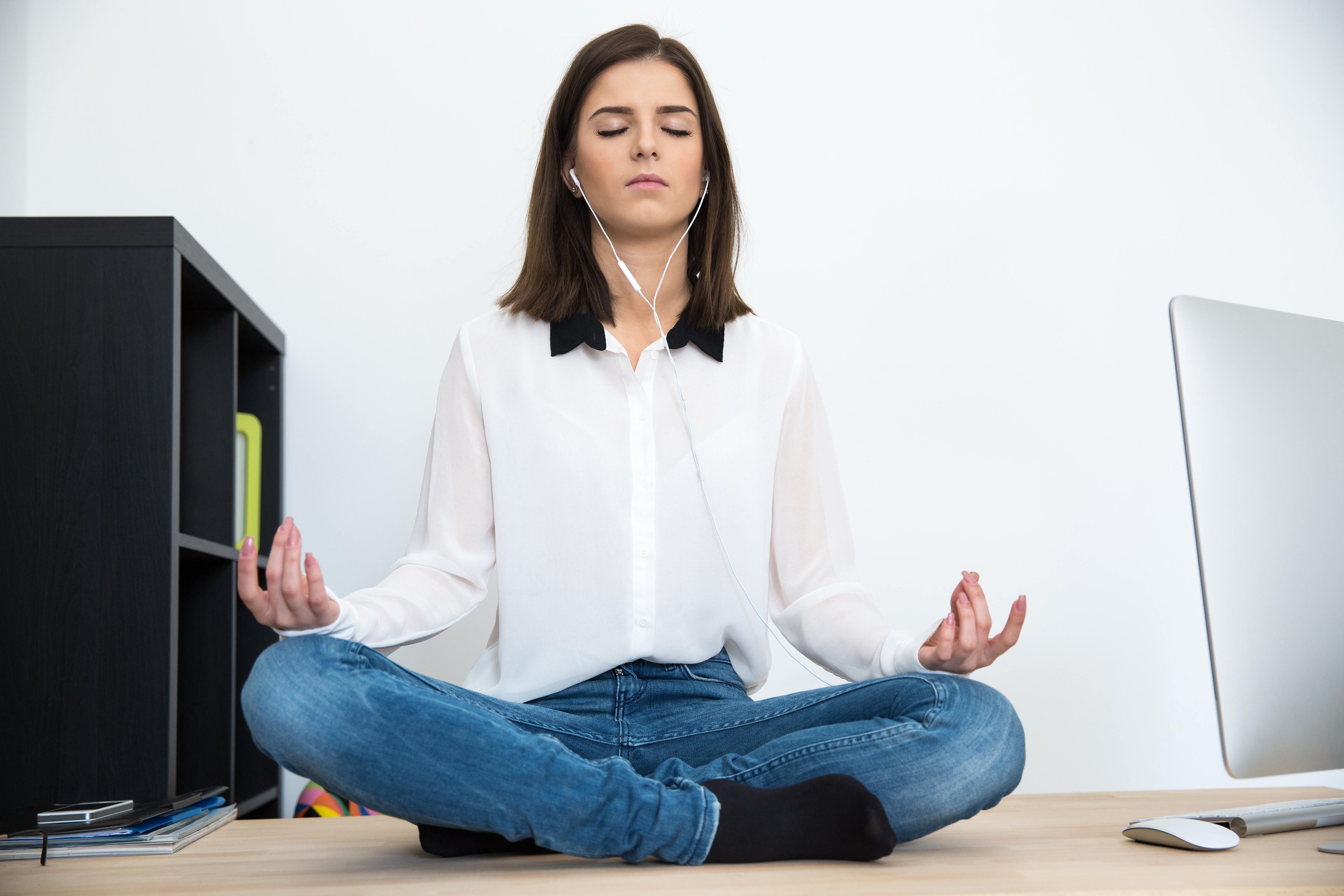Naturally coping with stress

More than 13 million working days are likely to be lost to stress-related illnesses this year.
Stress management has never been more important than it is today.
According to recent research by insurance company Axa, stress levels have doubled in the last four years.
Introduction to stress Management
What happens when we feel stressed is that our body's natural protection response kicks in - the flight or fight response - pumping us full of cortisol "stress" hormones. If this physiological response is triggered over prolonged periods it can be dangerous in the long-term.
Stress can destroy relationships, careers, and long-term health, as well as hitting the British economy hard. But it doesn't have to.
The damaging effects of chronic stress are becoming more widely recognized and discussed. Symptoms can be physical, mental or emotional, or all three. The effects on a person can be far-reaching and affect all aspects of their life.
Those suffering from chronic stress very often also adversely affect those around them, whether loved ones or work colleagues.
Even when stress is recognized as the cause of troubling symptoms, sufferers may be at a loss as to how to overcome the problem. For most people it is not as easy as simply removing or removing from the cause of the stress, as our lives are usually more complex and demanding than this will allow.
A major part of defeating the damaging effects of stress is learning to better deal with the stressors that ultimately lead to chronic stress. If those things causing the stress can be dealt with without triggering an elevated stress response, the mind and body will be so much better for it.
Additionally, even if stress responses do occur, positive steps taken to restore the body quickly to a healthy recovery state will prevent individual stressful events from developing into chronic stress.
This publication explores some of the proven natural methods for dealing with the symptoms of stress on a daily basis.
These techniques will help a majority of stress sufferers to reduce the impact of chronic stress symptoms in their lives.
Methods of Reducing Stress
Life for almost everyone is a series of stressful events, hopefully interspersed with periods of abatement and recovery. However, many people are operating their day to day lives under a continuous current of tension that seems to never leave them.
Cumulative stress can stem from conditions such as relationship issues, financial woes or job related problems. This can be compounded by self-image and selfworth issues. Whether your stress is chronic or acute, the good news is that there are proven healthy ways to cope with the symptoms. Also in the case of chronic stress, methods exist to help in reducing the body’s stress reactions to events and circumstances.

Express Your Stress
Precisely defining and expressing your anxieties and feelings can immediately help you begin to release the problem. Confiding in a good friend or close family member is always an option. Maybe you would prefer to see a counselling professional in order to receive a completely unbiased and non-judgmental view.
Check with your benefit package through your employer as some plans cover a certain amount of counselling visits per year.
If talking about what is bothering you isn’t your style, what about writing it down? Many people find writing a poem or a song to be extremely cathartic. Perhaps you are having a personal issue with someone.
Another method is to write them a letter expressing your feelings.
Get everything down and don’t worry about grammar or hurting their feelings.
The exercise is to simply vent as though they will read the letter but you actually never give it to them. You can write out everything you need to say and then burn it afterwards. Of course, depending on the scenario, you may want to deliver the letter.
That will depend on your situation.
Keeping a journal on a daily or weekly basis is very beneficial for many people. This method also gives you the opportunity to reflect upon other entries and see how you dealt with similar issues in the past. It is a good way to keep track of what problem solving methods seemed most effective.
Expressing your emotions is a great way to relieve your stressful burden and feel better. There is strong proof that documenting your gratitude, even for the smallest things, is very beneficial for improving personal outlook over time.
Taming Your Tension
Finding a positive way to release the tension from your system will help you let go of stress before it has a chance to chronically impact your cells, tissues and muscles.
Spending time with people who make you laugh and feel great is always a good option.
Spending less time with negative and irritating people is just as wise. When was the last time you read a joke book?
Watching funny movies can be a temporary pick-me-up and sometimes, that is all you need to clear your head and be able to look at your stressful situation with a fresh pair of eyes.
Find A New Hobby
Engaging in a new hobby can be a great way to relieve stress. By taking some time for yourself and learning a new skill, your focus can change and you may additionally meet a new diverse group of people.
Spending time volunteering for something you feel passionate about, spending time with animals and getting back to nature are all great ways to alleviate stress.

Time Management for Reducing Stress
A very complaint by most people is having too many things to do but with too little time to do them in. Most of us wish, at one time or another, that there were more than our allotted 24 hours in each day.
Not having enough time to do the things you want, time for your family, or what your boss wants you to do, is one of the most common contributing factors to persistent or chronic stress.
Many people also spend the little free time they do have fretting over the things still left undone, thereby missing out on pleasurable relaxation and further keeping themselves in a chronically stressed state. If you feel like you are constantly running in a hamster wheel, a great first step to master is effective time management.
To effectively overcome the adverse effects of stress, you need to learn proven techniques that have improved the lives of others. Here are some time management basics to help you better control your life and subsequently reduce your stress.
Know Your Priorities
Many people do not know when to say no, or are unable to do so, and find themselves being overscheduled as they keep on adding tasks to their to-do list.
In turn, they end up working even on weekends and after hours and becoming more and more resentful.
They know that some of the things they do are no longer a reflection of their priorities and values, while they also struggle to cope with those things that really matter to them.
When you start listing your priorities, don’t only list your work-related tasks. Make sure to include those activities that you need to do with your family and friends. Aim to achieve a work-life balance that reflects what you want.
Get Enough Rest and Sleep
One of the most common problems of people who lack time management skills is sleep deprivation. Excessive workloads and over-commitments have led the
importance of sleep to be devalued and unappreciated. Adequate quality sleep every night is essential for even average focus and concentration, to maintain efficiency and productivity.
It is well-known that the body restores and repairs itself during sleep. Recent research also indicates that those who do not get full night sleeps of 8 hours minimum have a higher risk of developing Alzheimer’s Disease later in their life.
Map Your Activities
Many people fall into a time management trap because they do not have a clear list of things that they do on a daily basis. They often find themselves wondering where their time goes.
When you do not take the time to sit down and map out your daily activities you will have a greater tendency to overestimate or underestimate the time you need to set aside for each task or activity.
Consequently, you become overcommitted, with very little or no time to spend with your loved ones and end up feeling inadequate and resentful.
Be Smart at Work
Being busy does not automatically equate to being productive. Spending too much time on something does not guarantee that you will be able to achieve more.
Whatever it is that you are working on you should always balance quality and quantity. Focus on the results, not only on being busy.
Look for ways to perform tasks more efficiently and never assume that the way it has always been done is the best way. Even small improvements add up and over a day can be the difference between being stressed or not.
Work with Your Goals in Mind
When it comes to time management, it is important to ensure that your daily tasks are moving you in the same direction as your goals in life. Think about what you want to be in life and what you plan to achieve in your career and personal life.
All these things should serve as your guiding principle on how you are going to spend each hour of your day.
With your goals in mind, it will become easier for you to manage your time, plan for your activities and work on your short-term and long-term goals. A major component of personal happiness is knowing and feeling that your daily activities are in tune with your long-term goals.
Conversely, if your short-term goals are not moving you towards your long-term goals, your subconscious mind will recognize this discordance and sabotage your best efforts. All this will of course, add to your feeling less in control and more stressed.

Once people enter the workforce they often struggle to deal with juggling between their family and work responsibilities. Why is it that some people seem to achieve success in both areas, while many others continually struggle?
What many people fail to realize is that an optimum work-life balance can be better achieved through the process of a values-driven time management technique. Of course there are also those are aware of the approach, but fail to implement it for various reasons.
The Basics of Time Management Process
The human brain is so great and clever that it easily becomes bored and distracted. While doing one task we may be thinking about another, or even musing things that are not at all related to the tasks we know we need to get done. We may even turn our attention to a new ‘task’ and forego the one we were attending to.
Effective time management basically involves documenting and following procedural steps that will help a person achieve greater efficiency in maximizing their use of time. Typical techniques being used in time management may include task analysis scheduling, task prioritization and list making.
It may involve, but is not limited to carrying out any or all of the following steps:
Write Things Down
Develop a complete understanding of all the processes that are crucial for the completion of a specific task and writing these steps down according to the order in which they must be performed.
The importance of this step cannot be over-emphasized. Our goal-seeking mind can quickly be trained to see each next step as a task to be completed and checked off, no matter how many times it has been done before. This creates a positive self-reinforcing loop that encourages focus on the tasks at hand.
Too many projects and jobs have no documented format or protocol and rely solely on repetition and memory. Taking the time and making the effort to document a procedure will open the mind to discovering wasted steps and potential improvements.
Individuals and businesses have made huge bounds in productivity by implementing procedure manuals for each and every task in their sphere of operation.
Tools
Use day planners, sticky notes, project management software, memo boards, memory tools, shared calendars and other tools that may serve as personal information manager to be able to ensure tasks are completed on time.
Monitoring
Closely monitor the execution of each step as it occurs. Use previously learned techniques that helped increase efficiency. Identify those steps that indicate potential of creating bottlenecks.
Work-life Balance
From a personal perspective the goal of better time management is to enable completion of tasks more efficiently, with an end-view to getting more done with less stress and having more time left over for optional pursuits.
When starting out in managing their priorities, there is a risk that a person may only focus on achieving their career goals while neglecting personal responsibilities in their family life.
Unfortunately, if the process of time management only emphasizes task completion while placing little importance on the preservation of work-life balance it can make a person even more prone to experiencing stress.
Some traditional approaches being used in time management strategies increase the tendency to over-emphasize efficiency and completion of tasks, while the process of aligning actions with the person’s values fall by the wayside.
This kind of prioritization may set the stage for failure as it causes negative thinking, especially during instances when one fails to meet a self-imposed deadline for a specific task.
A trap to avoid is that of solely prioritizing tasks depending on their level of urgency or according to their set deadlines, without taking into consideration the impact on an individual’s values in life.
When life is being managed well, there will be a greater focus on importance rather than urgency.
With practice, important events will be dealt with before they become urgent, there will be fewer ‘squeaky wheels’ to attend to, and stress will be greatly reduced.

Deep Breathing for Stress Relief
One of the first responses to a stressful event is a noticeable change in the respiration rate. If you are stressed, you’ll find you either breathe more rapidly or you go the other way and hold your breath. This is quickly followed by an increased heart rate and tightening of muscles as the stress hormones further kick in.
The good news is that our body has a parasympathetic nervous system that activates the “rest and digest” response to be able to rebalance, following the “fight or flight” response of the sympathetic nervous system.
When the stressful situation is over or diminished in intensity, a person will often find themselves taking deep breaths for relief. These deep breaths are vital to trigger a recovery and relaxation response in the brain. This will enable a normal breathing pattern to establish, which subsequently slows the heart rate, expands the lungs and relaxes the muscles.
The Dangers of Shallow and Rapid Breathing
Sometimes a person’s normal breathing pattern does not return promptly after the stressful situation has passed. They continue to take shallow and rapid breaths that cause the brain to maintain a stressed state, instead of entering the recovery phase. In turn, the body’s sympathetic nervous system also fails to relax and becomes overworked.
Hyperventilation causes a lower than normal carbon dioxide level in the blood and so "re-breathing" of air can help to restore the balance and improve symptoms. Breathing in and out of a brown paper bag (a bag) four or five times creates rebreathing and the desired effect.
For some people, hyperventilation is rare. It only occurs as an occasional, panicked response to fear, stress, or a phobia. For others, this condition occurs as a response to emotional states, such as depression, anxiety, or anger. When hyperventilation is a frequent occurrence, it’s known as hyperventilation syndrome.
Quite often when this happens the person experiences a panic attack. This will cause the depletion of essential nutrients in the body as the endocrine chemistry is further destabilized.
If these adverse changes in body functions persist for extended periods of time, the person will be subject to an increasingly higher risk of health issues, linked to having an overworked sympathetic nervous system due to constant exposure to stress.
Deep Breathing for Relaxation
Thankfully, activating the rest and digest response of the body is something over which we do have some degree of conscious control. By mindfully performing correct deep breathing we can “tell” our subconscious mind that the stressful situation has passed and more rapidly switch to our recovery or resolution phase.
Even if we do still feel threatened or challenged, invoking this response through deep breathing will allow greater clarity of mind, reduce feelings of alarm, and allow reasoned thought rather than panicked reactions.
When we talk about “relaxation response” it does not mean lying on a couch or sleeping on a bed.
The relaxation response that is promoted by consciously and actively deep breathing will provide a calm but mentally alert mind, capable of focusing on any given task and not distracted with symptoms of stress. This state of mind enables the body to achieve its resolution phase sooner.
Simple and Effective
Deep breathing technique focuses on taking deep, full breaths. While this may seem to be an overly simple technique, it has been proven to be extremely effective in bringing about feelings of calmness and relaxation.
It is easy to learn and you can practice it almost anywhere. Performing deep breathing techniques on a regular basis has been scientifically proven to positively affect a person’s digestive system, immune system, heart and brain function.
Simply mastering this technique will give you the confidence that you can deal with stressful situations as they occur.
This trust in your own ability will also lessen the undercurrents of generalized anxiety that keep your stress levels elevated. Whatever additional relaxation techniques you choose to practice, you should first learn the correct way to breathe deeply.
Deep breathing is the cornerstone of relaxation and it can be practiced along with other types of stress-reduction therapies such as music therapy and aromatherapy.
Many experts recommend that everyone set aside at least ten or twenty minutes each day to perform deep breathing exercises.
Music Therapy for Relieving Stress
Music has the power to soothe and improve our moods, we all know that, which is why music therapy is being used by more health professionals today, as a natural treatment for stress.

Relaxing Music Causes a Reduction in Cortisol Levels
It has been proven that people experience a greater reduction in their cortisol levels when music therapy is used, than those who do not partake in this therapy.
Experts say that music can help stimulate a person’s brain waves enabling them to resonate with the strong beat.
Music with faster beats were found to make people develop stronger concentration and improved alertness. Importantly for stress relief, music with a slower tempo works best in promoting a meditative state while also providing feelings of calmness.
Music Therapy for Alleviating Negative Emotions
Strange as it may seem, another study conducted by a group of Japanese scientists revealed that listening to sad music can actually help bring about positive emotions in human beings.
While this finding contradicts the belief of many, the study proved that sadness invoked by music is not the same kind of sadness that one feels after being exposed to a depressing or stressful situation.
Sad music can make a person feel good as well as relieve stress as it gently distracts the subconscious mind from the stressful clamor. This reduces and alleviates negative emotions while bringing more inspiration to daily life.
Music Affects Body Functions to Relieve Stress
As a person listens to music, their brain waves are affected which in turn causes changes in their body functions. Relaxing music causes an individual to take slower, longer and deeper breaths.
These physical reactions will also subtly alter a person’s emotional state which will help to reduce burnout and relieve stress.
For those who have a talent for composing original music, allowing themselves to get lost in their own self-penned music can greatly improve their creativity as they also experience respite from stress.
Focusing more on each note being played will allow an individual to forget about their stressful thoughts and experience a refreshing feeling.
There is just something about music that allows people to enjoy living and be more carefree, which is such a child-like and stress-free emotion.
Binaural Music for Therapy
There is a genre of music that can be tailored specifically to achieve stress reduction. This is known as binaural beat music. This type of music reduces stress by first altering a person’s brain frequency so that a relaxed state of consciousness can be achieved. Binaural beat music can also be beneficial for people who are plagued with anxiety, depression and panic attacks.
Although musical preference may vary from one person to another, listening to slow and classical music such as baroque is widely known and proven to provide a relaxing effect on a person’s mind and body. This type of music is used often in music therapy situations.
Music has the ability to absorb our attention, explore our emotions and provide a positive distraction. It also puts us in a meditative state, thus preventing the tendency of our mind to churn over our stressors. However, every person has the freedom to choose the kind of music that suits his preference and mood.
Some people totally avoid listening to music especially when they’re too busy and have a hectic schedule. What they may not realize is that music can actually provide a plethora of benefits.
From stress reduction to inspiration - it is no wonder that those individuals who listen to music while working have become successful not only in conquering stress but in achieving increased levels of productivity.
As the late, great Bob Marley said – “One good thing about music is that when it hits you, you feel no pain”.

Aromatherapy for Stress Relief
The various effects of chronic stress on the mind and body mean that there is no one simple solution to dealing with or alleviating symptoms.
Also, what works for one person may not be as effective for another, so anyone dealing with the effects of stress is well advised to research various tried and tested coping mechanisms.
As each person constructs their own resource of remedial actions, they will find that those that work for them also add strength and synergy to their other supporting behaviors.
In the past some people have been skeptical of the claimed benefits of using aromatherapy techniques for stress relief.
However, continued evidence from scientific studies as well as anecdotal reports have shown the effectiveness of aromatherapy in helping people who are plagued with the adverse effects of stress, especially chronic stress.
Why is Aromatherapy So Effective?
The human brain is wired to be very responsive to our sense of smell. Different scents can excite, relax, inspire or agitate us. Our response to scent is almost immediate and occurs subconsciously, with no effort on our part.
For therapeutic application, this means that aromatherapy can be used very effectively as a backgrounding treatment, requiring no concentration by the user. Focus can be applied to other tasks or relaxation techniques, without lessening the effects of the aromatherapy.
As the olfactory system is able to swiftly influence several actions in the brain, when essential oils are being inhaled, the volatile compounds released from the oil can provide rapid relief from symptoms.
Plants used for aromatherapy have certain compounds that are equally or even more powerful than many synthetic drugs and used properly are generally safer.
This means that finding a non-pharmaceutical solution for stress relief is possible and that aromatherapy should be considered for alleviating stress generally, and for overcoming specific symptoms.
Inhalation of Essential Oils
Many of the oils used in aromatherapy can also provide benefit when applied to the skin. However, not all oils can be safely applied to the skin and caution should be exercised. Although essential oils are derived from natural plant products some people may experience differing levels of sensitivity or even allergies.
Aromatherapy, by its very nature, means that plants being used do not have to be ingested but need only to be inhaled in small doses for it to be effective.
Simply inhaling the oil of patchouli and rose plants may significantly reduce nervous activity in some people.
Lavender and chamomile have proven therapeutic benefits as they help alleviate symptoms of aggression and lower cortisol levels too. Lemon is another trusted favorite, excellent for reducing stress levels and providing relief. Lavender and lemon scented candles are also utilized for stress relief.

Other Uses of Aromatherapy for Stress
Aromatherapy massage is very beneficial for relieving stress. The aromatherapy oils and the massage therapy combined are outstanding for reducing stress-related symptoms.
Topical application of clary sage, rose and lavender oils can greatly alleviate menstrual cramps for women too.
It must be noted that aromatherapy should be used with care by those who are pregnant, breastfeeding, asthmatic, suffer kidney problems or those who have epilepsy. You also need to consult your doctor if you are taking medications or if you are allergic to any plant substances.
If you have any doubt, please seek the advice of a professional Aroma-therapist before you start using essential oils for relieving stress symptoms.
Yoga for Stress Relief
There is a significant link between a person’s breathing patterns and state of mind. While many people may not recognize the connection, to experienced yoga practitioners it is a simple statement of fact.
Yoga teachers also believe that while shallow and rapid breathing can be a consequence of stress, if this breathing pattern is the norm the body maintains a more stressful state.
Take notice of how you breathe if you are startled. This is when you will find yourself doing a quick inhalation primarily to only your upper lungs. If this kind of rapid chest breathing becomes habitual, it causes the body’s stress response to be continually activated.
This persistent undercurrent builds chronic stress, with all its debilitating effects.
Consciously practice breathe deep into the bottom of your lungs to reduce feelings of panic and to help keep chronic stress at bay.

Nasal, Diaphragmatic and Abdominal Breathing
The yogic remedy for this rapid chest-breathing is the practice of certain breathing exercises that teach people how to breathe slowly and deeply and to maintain it as a healthy habit.
One way to do this is to breathe through the nose in order to allow greater resistance to the air that flows in the nasal passages. This slows the breathing rate and prevents ‘gulping’. Another benefit of nasal breathing is that incoming air becomes warm as it is being filtered in the nostrils.
An alternative practice is Ujjayi breathing, which is a diaphragmatic form of breathing. This method allows the vocal cords to be narrowed which increases air flow resistance and similarly slows down one’s breathing.
As the person performs Ujjayi breathing the sound created in the process enables yogis to achieve better meditative focus that reduces stress.
Both nasal and diaphragmatic breathing involve inhalation. In abdominal breathing, the person’s abdominal muscles squeeze more of the air out during exhalation.
Thus, a larger and more oxygenated breath volume will be achieved. Taking deeper and slower breaths is more efficient in bringing more oxygen into the lungs and then into the bloodstream. It also more efficiently carries out the exhalation of carbon dioxide and other waste products.
The process of slow effortless exhalation as practiced in Yoga can will help trigger an individual’s sense of calm and state of well-being. Slow exhalation releases tensions in the sense organs and relaxes facial muscles.
There will be improved communication between the brain and all the sense organs, creating feelings of wholeness and restfulness.
Advantages of Practicing Yoga Breathing Techniques
Rapid and shallow breathing increases the likelihood of elevated carbon dioxide levels in the body which can lead to mental agitation and an overall loss of physical and mental efficiency.
The breathing techniques being taught in Yoga enables the parasympathetic nervous system to be more active, while reducing the activity in the sympathetic nervous system. This means that the fight or flight response will also become less active, thereby creating a calm state.
The diaphragm is a muscle, and the diaphragm of a person who is chronically stressed is likely to be relatively fixed and inflexible. However, with regular practice of Yoga, the diaphragm will eventually become more elastic as more correct breathing exercises are performed. Improved breathing methods create a system much more capable of handling any kind of physical, emotional and intellectual stress.
Yoga Leads to Improved Control of Your Thoughts
Yoga also promotes better control over your thoughts. This creates an environment in the mind where unreasonable fears and anxieties are gently avoided.
Once this ability is developed the person will become more efficient in performing their daily duties and feel more stress free, rather than depleting energy with needless and useless worry.
Continual practice will allow a true sense of calmness and tranquility to fill the whole being.
For stressed individuals, the Sun Pose and other whole-body Yoga exercises are highly recommended so that the person will be encouraged to engage in deep rhythmical breathing.
Yoga is a beautiful and natural way to find stress relief every day.
Essential Oils for Stress Relief
Unfortunately, as more people are diagnosed with stress-related disorders the use of prescription medications to mitigate their effects has also become more prevalent.
Although these drugs provide short-term relief from some symptoms of stress, many experts claim that they also dull the mind as they depress certain brain activity.
The concern is that this will make it even more difficult for patients to engage in reducing the real cause of their stress.
However, it is important to note that prescription medications are not the only answer!
For a great many people, the effects of stress can be prevented or reduced by the use of essential oils.

Essential oils work in a different manner to most synthetic drugs.
They contain active compounds that help an agitated individual achieve a state of calmness while also inducing the so called restorative effect.
This is because the plants used for manufacturing essential oils produce an adaptogenic substance that induces the process of restoring balance or homeostasis in a person. This will therefore promote relief from feelings of anger, anxiety, tension and fear.
The following are examples of essential oils that are used for combating the symptoms of stress and providing natural stress relief.
Bergamot
Bergamot essential oil can either be diffused or applied topically. It is well-known for improving mood and treating the effects of depression.
Bergamot is part of the citrus family, and if applied to the skin can cause it to become ultra-sensitive to the burning effect of the sun.
Reduce exposure of treated areas for 24 hours after application to avoid sunburn. This warning applies to some other essential oils also, especially those derived from citrus species.
Cedarwood
The calming properties of cedarwood were found in several clinical trials to benefit children diagnosed with ADHD or ADD.
The active constituents found in cedarwood help stimulate the limbic region of the brain as well as the pineal gland, thereby inducing the release of melatonin that establishes and helps regulate a person’s sleep cycle.
This will then make it easier for an individual to achieve quality sleep and increased relief from stress. Consult your doctor before using cedarwood essential oil especially if you are pregnant.
Chamomile
Chamomile tea has gained much popularity for its ability to induce sleep among those who are suffering from insomnia.
As an essential oil, the calming properties of chamomile also help dispel anger, reduce anxiety and release negativity. You may rub it at the back of your neck or on your temples when you start to feel tension and stress creeping in.
Chamomile oil is used by many people during meditation. This oil can easily irritate sensitive skin if applied at too great a strength. It is best to dilute it along with carrier oils such as almond or coconut oil as a 50:50 solution.
Frankincense
This biblical favorite has served mankind for thousands of years and has many health benefits. Its powerful properties include its ability to stimulate the limbic area of a person’s brain which includes the pituitary gland, pineal gland and hypothalamus.
These effects are especially beneficial for people diagnosed with depression and anxiety. Frankincense encourages deeper, slower breathing, reduces anxiety and has an overall calming effect.
As you can see there are plenty of essential oils to choose from. Try them all, or find one you like and use it when you feel you need a little relief from your stressful day.
Meditation for Stress Relief

Meditation is a technique that has been used for thousands of years to bring a sense of calm and well-being to those who practice it. If practiced correctly, it can provide clarity of thought and inner harmony.
Meditation for stress-relief and relaxation purposes is most effectively performed by sitting in a quiet, clean space. Quieting the mind, focusing on your breath and eliminating thoughts as they arise are common techniques.
Some people like to visualize on something while they focus; others seek to clear their mind completely.
Taking Some Quiet Time for Yourself
It can be hard to find a quiet corner to spend a few moments in during our day, but really this is vital to our overall health. This is where meditation can become a useful tool and your new best friend. It can be difficult to turn off all electronic gadgets, and “unplug” if you will, for a while, but it’s important that you do.
Even well-meaning workmates and family members can overwhelm with constant chatter, leaving your own mind with no ‘free’ time.
Not having to listen to the constant barrage of noise from voices, music, traffic, animals, etc. can be truly liberating. During meditation, stress hormones and cortisol levels decrease and a sense of calmness is induced.
We have become so addicted to our radios, televisions, tablets and smartphones, that for the majority of the day, our brains are anything but calm and quiet. It is no wonder so many people have become addicted to their medications and drugs of choice.
Wouldn’t it be a more productive, relaxed and interesting world if people were addicted to meditation instead?
Focusing Energy on a Single Point
Start by focusing on a single idea or word when practicing meditation for stress relief purposes. Some prefer to focus on a sound or visualize an image. It is important that where you decide to practice is tidy, clean and uncluttered for maximum benefits to be attained. Sitting with eyes closed, in the middle of a quiet and clean place, is best.
Trying to clear your mind and release thoughts as soon as they enter, if they do not align with your focus, can be tricky at first.

It is easy to dismiss meditation as something peculiar or part of the new age beliefs but it is practiced by some financially sound individuals, past and present and if it leads to relaxation, calm and could also increase my bank account to the tune of $680 Million, I’ll hug trees all day long.
It is common for people to feel frustrated when they begin meditating as they think it will be easy to quiet their mind, only to find that numerous thoughts come flying in and around out of seemingly nowhere and completely unrelated and this is normal. Some tools are available like biofeedback to help focus the mind.
We spend the majority of our day on autopilot and processing so much information simultaneously; trying to focus on one, single thing for any length of time can seem hard.
Our poor minds, which are usually under constant bombardment, see this quiet time as an opportunity to think about the things you have not made time to think about earlier.
With practice, your mind will trust that you will be giving it future “quiet time” and will allow you to quiet your thoughts.
Persist with practice and give yourself kudos for every extra minute you make it! Once you master this wonderful practice you will truly be able to exercise greater control over the symptoms of stress.

Sing, Dance or Play Music for Stress Relief
Utilizing music to enhance your mood is one of the easiest things you can do when you are feeling overwhelmed and stressed. Do you ever notice how when you hear a favorite song and turn it up to sing along, or even start to dance, that almost immediately you feel happier?

Music can instantly take your mind off of the issues at hand that are causing you grief and leave you feeling much better about yourself and the world.
Listening to some tunes is a great option when you are too physically and emotionally exhausted to incorporate some traditional exercise in your day.
If you can get your body up to dance, even just for one favorite song, your heart will start pumping and positive endorphins will be released. Physical activity will also burn up any stress hormones active in your system.
Working out at home via dancing in the living room to some music can be just as beneficial as hitting the gym. Grab some soup cans or bottles of juice for light hand weights and get your heart rate going!
Maybe you have some ankle weights gathering dust in the basement? Strapping them on and cleaning the house to some loud music is an easy way to get a workout in.
Different Kinds of Music
Depending on your personal preferences, you may enjoy a wide range of music or only one genre. Perhaps you like instrumental music only, something that reminds you of visiting the spa for a massage.
Maybe you prefer to rock out on your air guitar to some loud rock and roll or the latest pop song.
Your choices will likely vary with your mood. Even if you are sad and start with poignant tunes, you may find yourself moving to more upbeat happy songs by the end of the session. Pick music that resonates with your soul. Play it often. You and your houseplants will notice a positive difference in your energy levels!
Free Music from the Library
Tired of your CD collection?
Too busy to download some new music from your computer?
Too broke to have a Satellite Radio subscription? No worries! Many people forget that most local libraries offer a wealth of resources other than books. There are hundreds of music CDs and DVDs that can both enlightening and relax your mind.
Watch your favorite band play live in concert via some DVDs. Take some new CDs along on your next road trip or while you are stuck in your traffic commute.
Listening to the music before you buy or spending time searching online can be mind-expanding. You may fall in love with some new music groups or old classics that you never would have stumbled across otherwise.
New Age Music
This broad term encompasses a particular genre of music that blends modern technology and ancient, instrumental music to create relaxing melodies. For example, Celtic music is one of the most popular kinds of stress relief music that falls into this category. The harmonic sounds can get your imagination going somewhere positive. The upbeat, “River Dance” kind of songs are great when you have to mow the lawn or want some new lively music for your cardio workout.
Music that contains certain instruments such as the piano, flute or the Celtic harp can be excellent choices to help you relax.
Perhaps you respond well to ocean waves and sounds of nature. Some people find that their creative energy seems to flow better when they listen to these kinds of music.
As they become more relaxed, it is possible that their creative side can come out to play easier.

MOSCOW - JUNE 23: Folk musicians and woman dancer performance at the Moscow Historical Festival Times and Epoch in Kolomenskoe on June 23, 2013 in Moscow, Russia.
Conclusion
It would be hoped that for most people who have been diagnosed with chronic stress, or who recognize form their symptoms that they are affected by it, that these tried and tested methods can bring a degree of recovery from these symptoms.
Overcoming chronic stress comes about in a similar manner to its occurring – it is a slow, steady building process. Small wins add up to big wins and positive effects are cumulative. Many people have hugely improved their quality of life by using combinations of the methods discussed above.
However, if these methods are not helping you, or if your symptoms are severely affecting your life and relationships, do not leave it too long to seek professional help.
Thankfully today, others are aware of the problem and support mechanisms are available to help individuals deal with what is becoming an increasingly common social problem.